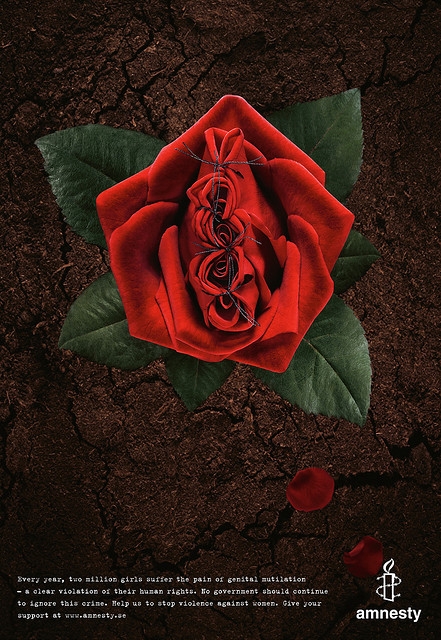Far from being an external or an African problem, it is estimated that around 500,000 women living in the EU have undergone female genital mutilation (FGM) and close to 180,000 young women and girls are at risk from it every year. Different initiatives on the EU level try to tackle this problem, with the lack of efficient and effective enforcement being a major challenge.
As defined by the World Health Organisation (WHO), Female Genital Mutilation (FGM) comprises all procedures involving partial or total removal of the female external genitalia or other injury to the female genital organs for non-medical reasons. It causes serious physical and mental harm. This practice has been said to amount to a violation of the right to life (Article 2 ECHR) and to be cruel, inhuman or degrading treatment (Article 3 ECHR).
Not an “African problem”
Far from being an external or an African problem like we too often hear, according to the European Parliament 2012 resolution it is estimated that around 500,000 women living in the EU have undergone female genital mutilation (FGM) and close to 180,000 young women and girls are at risk from it every year. To address this gender-based violence and human rights violation, in 2013 the European Union in the form of the European Commission Communication on the Elimination of FGM established an EU action plan which put forward in equal footing the need for preventive measures and prosecution of such crime.
Photo credit: layalk via Foter.com / CC BY-NC-ND
The EU Victims directive was seen as one major step to strengthen the position of those fighting against FGM. FGM stakeholders working with victims estimate that the directive, which is fully applicable since November 2015, has great potential in offering support to victims when fully and well implemented by the Member States. But unfortunately, many member states have up to now failed to transpose the directive into national law. Therefore, on February 22 – the European Day for Victims of Crime – the Commission opened infringement procedures against 16 Member States for non-communication of the Directive, which means that those members had yet to provide the Commission with information on the transposition of the directive into national law. Such infringement procedures may take years, thus hindering the Commission to enforce quick and comprehensive entry into force of EU law. The case of the Victims Directive thereby exemplifies the general problem of the lack of common application and absence of effective and efficient enforcement procedures on EU level. In the case of FGM, this means that victims in many EU member states probably are still not getting the support they would be entitled to according to the directive.
The Istanbul Convention – a helpful tool in the fight against FGM
On the other hand, another step into the right direction is the fact that the Commission’s Strategic Engagement for Gender Equality[1] has put FGM as a stand-alone key action to combat gender-based violence and protect and support victims. Continuing the work toward better data collection, awareness raising and support of Member States and civil society’s effort regarding violence against women, Věra Jourová, Commissioner for Justice, Consumers and Gender Equality in March 2016 furthermore proposed EU accession to the Council of Europe Convention on preventing and combating violence against women and domestic violence (Istanbul Convention) for 2017. By having 2017 be the European year dedicated to combating violence against women, Jourova took yet another step in order to put the topic at the top of the EU list of priorities.
Regarding the fight against FGM, such a step would definitely be helpful: The Istanbul Convention requires States Parties to criminalise the subjecting or coercing of a woman or a girl to undergo FGM in addition to inciting a child to do the same (Article 38). Therefore, the EU ratification of the Convention would provide better data collection and accountability in regard to a proper monitoring and effective application by the Member States.
Complex issue, complex solutions
FGM is a complex issue so there is a need for concerted and multi-disciplinary actions with all relevant stakeholders as well as involvement of the communities in which FGM is in practice. In other words, as much as criminalisation is important, prevention and peer to peer education are essential to change behaviour. The EU funded project “European Knowledge Platform for Professionals Dealing with Female Genital Mutilation (FGM)” could be a tool to make this happen. The web-based knowledge platform will serve as a European resource and education centre on FGM. It builds upon the successful results of the United to END FGM E-learning Course which enhances the capacity of professionals. Another promising approach is Men Speak Out, a project which puts men at the centre of the solution to end FGM – a great way to involve communities and avoid stigmatisation.
If you would like to keep up-to-date and learn more about FGM, sign up to the End FGM European Network newsletter and attend the conference on Gender-Related Vulnerabilities in the EU Asylum Procedures: Spotlight on FGM that will be held on 8 November in Brussels.
[1] It is true that the “Strategic Engagement” is only a staff working document (instead of an actual gender equality strategy, as it used to be the case before) and thus does not have any inter-institutional value, which is a downgrade and can be seen as a step back. However, in the case of FGM, the fact that the fight against the practice was put as a stand-alone key point nonetheless is a step forward, as this shows the recognition of the problem and the commitment of the Commission to resolve it.


![Ignoring the subject: the discussion about VAW in Poland – Nie znam się to się wypowiem: czyli o przemocy wobec kobiet w Polsce [EN/PL]](https://www.youngfeminist.eu/wp-content/uploads/2015/11/images-150x150.jpg)


It’s time we stopped with all this writing and start the work that really needs to done. We need this countless conferences and meeting to stop bexcuse we already know FGM is heinous act of crimes against humanity and against women and girls.it’s gender and honour based violence I am a survivor who fight FGM with every fibre in me. I know how cruel this ptactics this is .its child abuse that leaves you with life time pain and despair.we need to act as one . Unity is power. Education. Is the heart of eradicating FGM. Knowledge is freedom and we as society need to use it for greater good.I just want this injustice against women and girls to end.I use my own Trauma in educating others. In UK where I am based amazing work happening all over.I recently came from Canada to advice the government on how to tackle FGM.glorally world is waking up.
Dear Hibo,
Thank you so much for your input and for sharing your experience and the initiatives and work that you are doing in eradicating FGM. this article was not about questioning what is FGM or its consequences, but more like having a reflection on the work that have been done so far, on the legislation that have been put in place and to highlight the great and ground work done by NGOs. As yesterday was the international day for Girls, to me it was important to tackle this aspect of work and put to the light those NGOs and the work and initiative they are doing. And of course those are just a very small amount in regards of all the great initiatives that are happening globally and locally.
[…] externes de la femme ou toute autre lésion de ces organes pour des raisons non médicales. Un demi-million de femmes vivant dans l’Union européenne ont subi une mutilation de ce type et près de 180.000 filles et jeunes femmes sont à risque […]
I represent an NGO in Nigeria called Total Care Unit and we would like to send our staff for an international conference on FGM. We would like to know your schedule for your FGM conferences for 2017. If you don’t have any for this year could you recommend another organization that could have FGM conferences some time in the second quarter of this year.
Dear Total care Unit, thank you for the interest. Here is the link to END FGM European Network: http://www.endfgm.eu/ in there website you will be able to found out about all their event and if not feel free to directly contact them.
best,
Celine